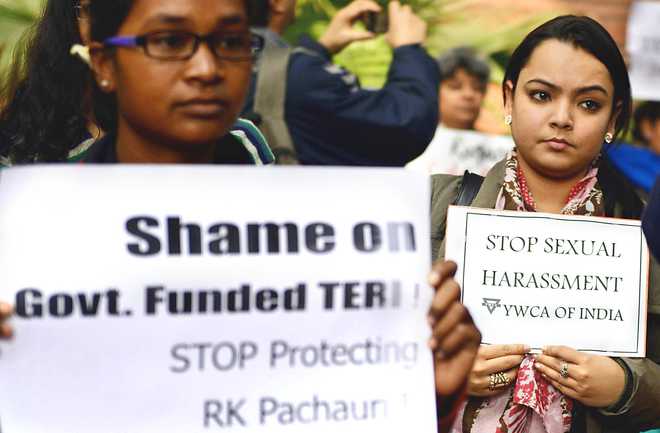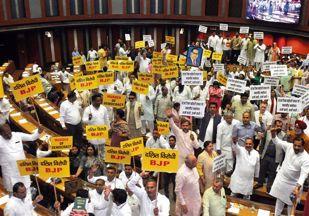
Activists protesting against Vice-Chairman RK Pachauri outside The Energy and Resources Institute (TERI) office in New Delhi. PTI
Rainuka Dagar
THE recipient of the second-highest civilian award, the Padma Vibhushan (and also Padma Bhushan, among a spate of other accolades globally) is charged of violating the dignity of a junior female colleague. He was then Chairman of the UN Intergovernmental Panel on Climate Change (IIPC). The IIPC was awarded the Nobel Prize received by Pachauri and Director General The Energy and Resources Institute (TERI), a reputed energy and environment research think tank. The Delhi Police booked RK Pachauri (with an FIR on February 1, 2015) on grounds of assault, sexual harassment, stalking and criminal intimidation.
Amidst the media glare, Pachauri resigned from the IIPC on February 24, 2015, was asked to leave the Prime Minister’s Council on Climate Change and proceeded on leave from TERI. However, on February 8, 2016, he was promoted as Executive Vice-Chairman and included in TERI’s governing council. This despite TERI's Internal Complaints Committee (ICC) having found finding him guilty, and a formal case pending, (the Delhi Police is now filing a charge sheet in 15 days). Another ex-TERI employee then made open a previous complaint, slotting him as a repeat offender. There was public outrage. The TERI students protested against the “unethical” appointment, refusing to accept their degrees from him at the convocation in March, with protests outside TERI office, and media coverage all of which has now led to a change in TERI leadership and Pachauri was sent on leave again.
Sexual harassment at the workplace is common, with status and position no bar to misbehaviour, it occurs across different work arenas — whether it is a sexual bargain involving a farm labourer and owner; a casting couch (for both sexes) in the film or television industry or in the increasing women-populated offices in Delhi, Mumbai, Pathankot, Mangalore or Ujjain. Nor are rights' custodians — judges, archangels of civil society or safety providers — the police, above board in exploiting women.
The extent of these violations are however not reflected in the reported cases with the violation rate being reported at 0.1 per cent (CAW 2014). But sexual abuse at work place is real and extensive, and can be gauged by unreported incidents and global prevalence. In India, the Vishakha Guidelines issued by the Supreme Court in 1997 first defined sexual harassment at the workplace and made employers obligated to protect women and put a complaints mechanism in place.
This was followed by the sexual harassment at the workplace (Prevention and redressal Act) in 2013. Yet the rising insecurity of women felt by opening of a Pandora's box with the likes of Tehelka or the Justice Ganguly cases, much needs to be done to make workplaces safe.
There are a number of lessons to be learnt. One, women storming into "empowering" zones such as employment and panchayats does not provide a makeover, with gender inequalities continuing to shadow men and women, leading to newer violations.
Two, it is the conditions that give rise to the inequalities that have to be tackled, not just the manifestations that keep changing with changed socio-economic dynamics. The concept of "eve teasing" as a violation, abuse at workplace, hiring wombs for surrogacy are new arenas rising with increasing mobility, technological innovations and development of the market. These new forms take time to understand, unravel and require new laws, procedures and campaigns to overcome. It is, however, the gender relations, roles, social expectations and values that need to be addressed to root out the well of inequalities.
Three, it is not a boxing ring with male versus female corners, which the discourse is deteriorating into. Shoma Chaudhary was a woman activist and Managing Director of Tehelka who was alleged to be part of a cover-up of sexual harassment against the Founder-Editor Tarun Tejpal and resigned as public pressure mounted. The fight is against a patriarchal management and public space that has transcended the narrow confines of the home. Nor is it to say that most men are harassers. On the contrary, it is the silence of the vast majority, both men and women against practices, and conduct that allow these transgressions to continue.
Four, the individual lynching of a public figure will not change the relation of subordination and body bargaining. The assumption of jurisprudence that by punishing culprits it acts as a deterrence for others does not work when norms and social meanings promote sexual subordination and domination. The female body in particular, is being clothed, styled to draw attention and has social approval with fathers applauding their scantily clad daughters exchanging sexual euphemisms on television reality shows, the fashion industry dictating the choice of clothes and standards of beauty which are sexist and attractive “physical appearance” is stated to be a confidence booster. These are being made part of the modern work culture where boundaries of conduct, time and hierarchy are all being breached.
Five, where incidents are becoming highlighted, people are taking strong exception to the violations. Public is aware and sensitised but not prepared. The reactions are to individual incidents not to constructing mechanisms and processes to sanitise, prevent or act against violations in their own spaces.
There is a pertinent message in the act of German referee Rudolf Kreitlein who marched the Argentinian Captain off the soccer field with the red card "for the look in his eye". Incidentally, England went on to win the World Cup quarter final in 1966. Intimidation, abusive language and violent gestures are not confined to sexual politics but are recognised as abberrations in civilised interactions, transgressions of which are punished.
Safety laws are the first line of defence and their operationisation through committees, redressal mechanisms provides for access to rights. But the onus is also on us the citizens to create a safe atmosphere, promote codes of conduct that are non-sexist — a bikini is appropriate wear on a beach not at a mall, just as a suit and not Hawaiin shorts are the dress code for a President at official functions.
Organisations need to establish gender codes of conduct and take strict action for looks, gestures and language, activate internal committees, initiate and open up discussions on gender-based work ethics rather than waiting to clamp down on abusive incidents.
The writer is Director, Gender Studies, Institute for Development and Communication, Chandigarh.



























